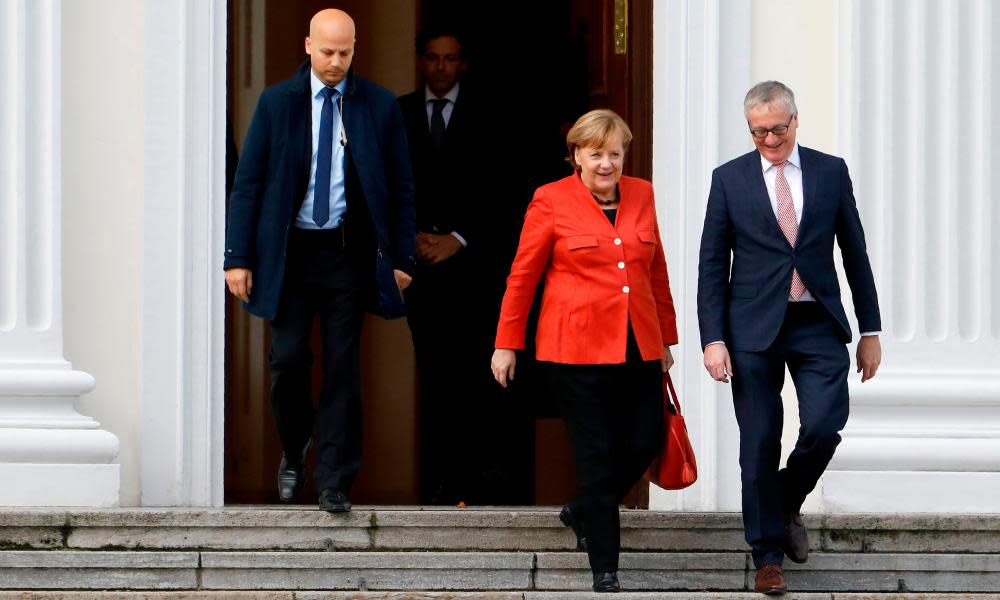Collapse of German coalition talks underlines Merkel's weaknesses

After exploratory talks to form Germany’s next government collapsed in dramatic fashion shortly before midnight on Sunday, the culprit was quickly found: Christian Lindner, the cocksure leader of the pro-business Free Democratic party (FDP) who had staged a well-orchestrated walkout, makes an all-too convincing villain of the piece.
But in the coming weeks German media will have to ask whether the real reason for the political paralysis in Europe’s biggest economy ultimately lies with another politician: Angela Merkel, the incumbent chancellor.
Merkel’s party colleagues and Green politicians had unanimously pointed their fingers at Lindner on Sunday night, insisting they had seen sufficient common ground for a compromise. Some of them voiced suspicions that the pro-business party had never really believed in their political enterprise in the first place.
Exactly which of his party’s red lines the coalition talks had overstepped, Lindner has been unable to convincingly explain. Green party co-leader Katrin Göring-Eckardt on Monday claimed that the FDP had called off the talks in spite of victories in key policy areas. In a country where political stability is valued as highly as it is in Germany, accusations of recklessness could haunt the traditional ally to Merkel’s CDU for years to come.
And yet the coalition talks of the last month have shown that a “Jamaica” coalition – so nicknamed because the colours of the Greens, the CDU and the FDP mirror those of the Jamaican flag – would likely have been an unstable one, filled with distrust and prone to imminent collapse. “It is better for a governing alliance to collapse before it has been forged than for it to drag itself through the legislative period in disharmony,” conservative broadsheet Frankfurt Allgemeine Zeitung opined on Monday morning.
The FDP’s petulance, and the Social Democrats’ unwillingness to open up talks about another “grand coalition” with the CDU, are directly linked to the Merkel question: both parties suffered existential setbacks after going into government with a chancellor who has become an expert at adopting and coopting other parties’ key policies.

“In the last few weeks, Merkel has been like the hinge of a door that opens to both sides of the political spectrum,” said Gero Neugebauer, a political scientist at Berlin’s Free University. “But that strategy hasn’t worked, and the debate about Lindner’s betrayal is already moving on to a debate about Merkel’s failure.”
It remains possible that moral outrage about the FDP walkout could form the emotional glue for a governing coalition between the CDU and the Greens, but this would be 42 seats short of a majority and have to rally support from other parties on a policy-by-policy basis: an unprecedented situation for a fresh government in post-war Germany.
But both a minority government or fresh elections will first involve the authority of Merkel’s chancellorship being tested in the Bundestag. To engineer a no-confidence vote that would trigger new polls, Merkel would first have to be formally voted in as Germany’s chancellor. If she fails to gain a sufficient majority, her loss of power will come even sharper into focus.
Yet even if there were to be new elections in spring next year it is possible that Merkel could run again. Seventeen years after she took charge of Germany’s conservative party, there are still no credible candidates for a coup at the top, nor candidates with her blessing that look ready to take over the helm. For now, the only party in Germany calling on Merkel to go is the far-right Alternative für Deutschland.
The end of Merkel may be closer than it has ever been. But when it comes, it will still be because she has decided to jump, rather than because she was pushed.

 Yahoo News
Yahoo News 
